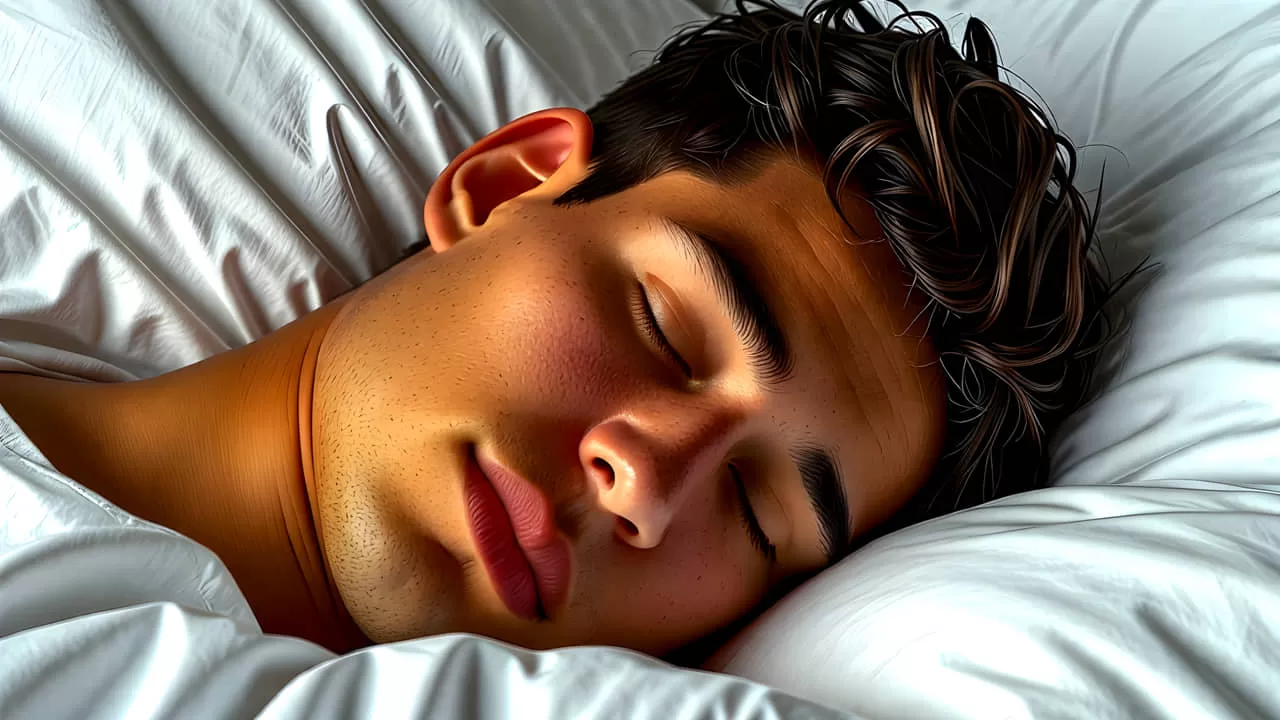Key Highlights
- Consistency in sleep schedule and bedtime routines enhances sleep quality and habits.
- A sleep-friendly bedroom with a comfortable environment boosts sleep quality.
- Limiting blue light exposure before bed helps regulate the sleep-wake cycle.
- Regular daytime exercise promotes better sleep; avoid exercising right before bed.
- A balanced diet, reduced caffeine and alcohol, and stress management improve sleep hygiene.
- Consult a professional if sleep issues persist to identify and address underlying sleep disorders.
Are you getting good sleep at night?
If you want to maintain your health and well-being, then you must get a good night’s sleep. Unfortunately, many struggle to get the quality sleep they need. If you are one of them, then this article is for you.
Sleep hygiene refers to the healthy habits, behaviors, and environmental factors that promote good sleep. Just like hygienic habits help in improving the quality of our lives, a healthy sleep schedule helps in improving the quality of our sleep.
There are many ways to establish good sleep hygiene. These include establishing a consistent sleep schedule, creating a pre-sleep routine, designing a sleep-friendly bedroom, limiting exposure to blue light, exercising regularly, minding your diet, and many more.
Following these will go a long way in ensuring that you enjoy blissful nights of restful sleep.
Table of Contents
The Importance of Sleep Hygiene
Sleep hygiene isn’t a fiction—it is extremely important for maintaining your overall health and well-being.
Let me now talk about why maintaining good sleep hygiene is so crucial for promoting our physical, mental, and emotional health.
1. Sleep Enhances Physical Health
Quality sleep is essential for your body’s repair and recovery processes. During sleep, your body works hard to repair muscles, consolidate memories, and release essential hormones. If you have poor sleep hygiene, then all these processes can get disrupted. This can be very dangerous, as it can lead to a weakened immune system, increased inflammation, and a higher risk of chronic health conditions such as obesity, diabetes, and heart disease.
2. It Boosts Mental Well-being
A peaceful and restful sleep at night will make sure that your brain’s cognitive functions, such as memory, concentration, and problem-solving, keep working properly.
If you don’t get enough sleep or the quality of your sleep is compromised, you may find it difficult to focus properly, make the right decisions, and manage your emotions.
Having poor sleep hygiene for a long time can also cause mood disorders like depression and anxiety to set in.

3. Regulates Emotional Balance
Sleep plays a significant role in regulating our emotional well-being. When you do not get quality sleep at night, you will experience irritability and mood swings, and your stress levels will increase.
On the other hand, if you develop good sleep hygiene, your mood will stabilize, and your emotional resilience and overall outlook on life will improve.
4. Improves Productivity and Performance
When you’re well-rested, you’re more likely to feel energized, focused, and productive throughout the day. Good sleep hygiene will ensure that you will get the restorative sleep your body and mind need. This will enable you to perform your daily activities properly and also do well at school and work.
5. Enhances Quality of Life
Consistently getting a good night’s sleep can significantly improve your quality of life. Sleep can give you more energy, strengthen your immune system, enhance your cognitive abilities, and improve your overall sense of well-being.
Hence, by giving priority to sleep hygiene in your life, you are ultimately investing in getting better health and happiness in the long run.
10 Crucial Tips for Enhancing Your Sleep Hygiene
Maintaining good sleep hygiene is key to ensuring a good night’s sleep. Here are 10 crucial tips to help you enhance your sleep hygiene:
1. Establish a consistent sleep schedule
A key factor in maintaining good sleep hygiene is establishing a consistent sleep schedule. You must go to bed and wake up at the same time every day, even on weekends. This helps regulate your body’s internal clock, also known as the circadian rhythm.
This consistency in sleeping trains your body to anticipate sleep and wakefulness at specific times. This will make it easier for you to fall asleep and wake up refreshed every single time.
You must follow this sleep schedule consistently to optimize your sleep habits and improve your overall sleep health.
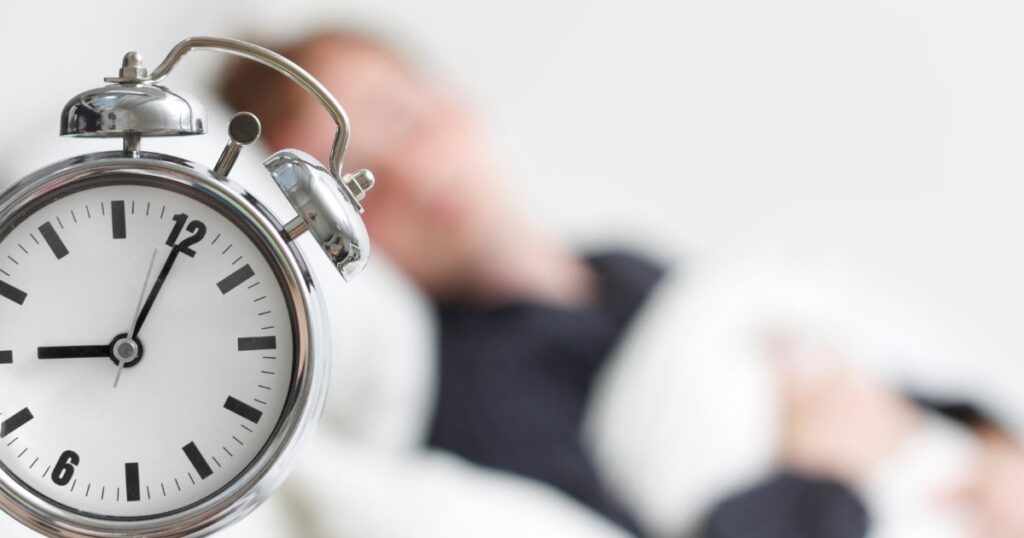
2. Create a pre-sleep routine to unwind
It is good to create a pre-sleep routine for yourself. This will send a signal to your body that it’s time to relax, unwind, and get ready for sleep. Here are some activities you can include in your bedtime routine:
- Take a warm bath or shower to relax your muscles and promote a sense of calmness.
- Perform some relaxation techniques, such as deep breathing exercises or meditation, to quiet your mind.
- Read a book or listen to calming music to help shift your focus away from the day’s stressors.
- Avoid stimulating activities or screens (electronic devices) that emit blue light, as this can interfere with your body’s natural melatonin production, a hormone that helps regulate sleep.
Incorporating these activities into your pre-sleep routine will help you transition peacefully from wakefulness to sleep. This is extremely important for improving your mental well-being and health.
3. Design your bedroom for optimal sleep
Properly arranging your bedroom to create an optimal sleep environment is essential for good sleep hygiene. By optimizing your sleep environment, you can create a peaceful and comfortable space that promotes a restful night’s sleep.
Here are some sleep hygiene tips related to making your bedroom comfortable:
- Keep your bedroom cool, ideally between 60 and 67 degrees Fahrenheit (15.6 to 19.4 degrees Celsius), as a lower temperature promotes better sleep.
- Invest in a comfortable mattress and pillows that support your body and provide adequate pressure relief.
- Use blackout curtains or an eye mask to block out any unwanted light that may interfere with your sleep.
- Eliminate noise distractions by using earplugs or a white noise machine to create a quiet and peaceful sleep environment.
- Remove electronic devices from your bedroom to minimize distractions and limit exposure to blue light, which can disrupt your sleep.
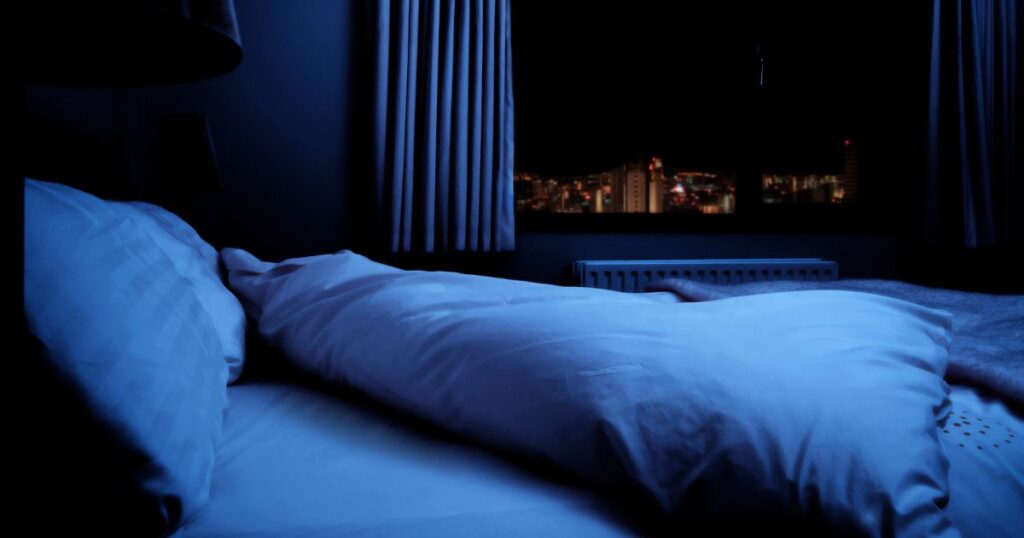
4. Limit exposure to blue light before bedtime
Limiting exposure to blue light from electronic devices before bedtime is crucial for good sleep hygiene.
Blue light emitted by smartphones, tablets, and computers can hamper the production of melatonin, a hormone that regulates our sleep-wake cycles. Here are some tips to reduce blue light exposure:
- Turn on the night mode or blue light filter on your electronic devices to reduce the amount of blue light emitted.
- Avoid using electronic devices at least one hour before bedtime to allow your brain to prepare for sleep.
- Replace screen time with calming activities such as reading a book or listening to relaxing music.
- Keep electronic devices out of the bedroom to minimize the temptation to use them before bed.
You can ensure that your brain is ready for sleep and promote a more restful night’s sleep by reducing your exposure to blue light before bedtime.
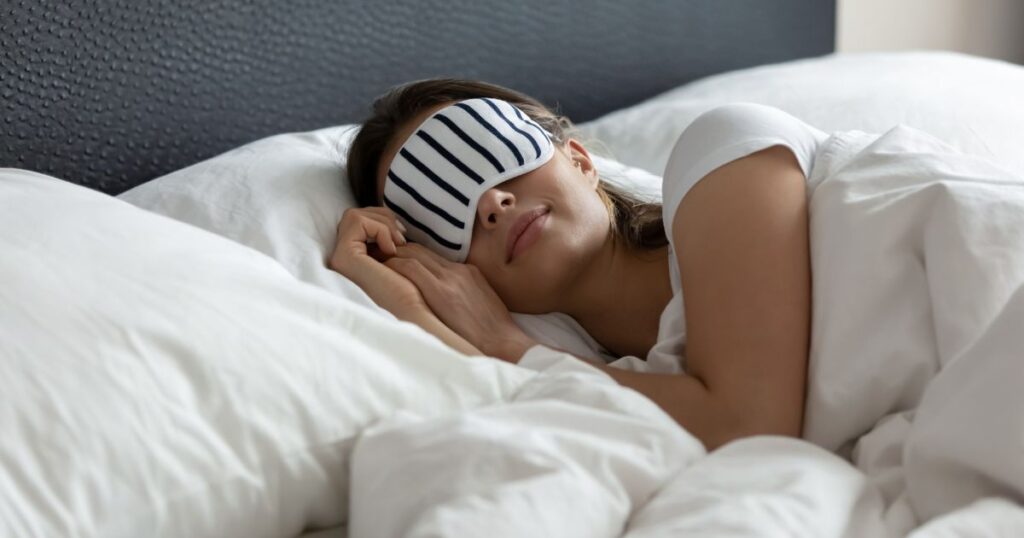
5. Exercise regularly but not right before sleep
Regular exercise is beneficial for overall health and can also improve sleep quality. Engaging in physical activity during the day can help regulate your sleep-wake cycle and promote better rest at night.
However, it’s important to avoid exercising right before bedtime, as it can increase your heart rate and make it more difficult to fall asleep. Aim to complete your exercise routine at least a few hours before bed to allow your body and mind to relax and wind down. This will enhance your sleep hygiene and help you enjoy better sleep quality.
6. Manage stress through meditation or yoga
Stress and anxiety can also significantly impact your sleep quality. To combat these, try to incorporate some stress management techniques, such as meditation or yoga, into your daily routine.
Meditation and yoga are both age-old practices that reduce stress hormones and promote a sense of calmness in our mind and body. This makes it easier for us to fall asleep and stay asleep.
You can set aside some time each day for mindfulness meditation or doing gentle yoga stretches. These will alleviate stress and improve your sleep hygiene.

7. Mind your diet and avoid heavy meals late
Your diet and food choices can have a significant impact on your sleep quality. It’s important to plan your diet and eat healthy food if you want to maintain good sleep hygiene.
Avoid consuming heavy meals, especially close to bedtime, as this can lead to indigestion and discomfort that can disrupt your sleep. Instead, opt for lighter meals that are easier to digest. This will keep your digestive system happy and give you high-quality, deep sleep.
Hence, it is better to avoid caffeine, alcohol, and any other food or beverage that can make it difficult for you to fall asleep, before bedtime.
8. Reduce caffeine and alcohol intake
Apart from avoiding heavy food at night, you must also be mindful of your caffeine and alcohol intake. Both caffeine and alcohol can have a significant negative impact on your sleep quality.
Caffeine stimulates the nervous system and increases our alertness. Hence, it can be difficult to fall asleep. So it’s best to limit or avoid caffeine in the afternoon and evening. You may opt for decaffeinated options if you really feel the urge to drink something at night.
On the other hand, while alcohol may initially make you drowsy, it can disrupt your sleep patterns and lead to a restless night.
It’s best to limit or avoid caffeine in the afternoon and evening, and alcohol before bedtime to promote better sleep hygiene.

9. Ensure your mattress and pillows are comfortable
If, after doing all these things, you are still not getting the desired sleep, then its time to look at your bed.
The comfort of your mattress and pillows plays a crucial role in ensuring a good night’s sleep.
An uncomfortable mattress can cause discomfort, pain, and poor sleep quality. Hence, it is absolutely essential to sleep on a mattress that provides adequate support and comfort for your body.
Not only mattresses, but pillows that are too flat or too firm can lead to neck and shoulder pain. This can make it difficult to find a comfortable sleeping position.
Choose pillows that align with your preferred sleeping position and provide proper support for your head and neck.
Trust me, buying a good mattress and pillows is going to be one of the best investments you can make!

10. Seek professional advice if sleep problems persist
If you continue to experience sleep problems despite implementing good sleep hygiene practices, it may be beneficial to seek professional advice from a healthcare provider.
Experiencing persistent sleep problems could be a sign of an underlying sleep disorder that requires further evaluation and treatment by a professional. A qualified healthcare provider, such as a primary care physician or sleep medicine specialist, can assess your symptoms, conduct the necessary diagnostic tests, and recommend appropriate treatment options.
These professionals will give you all the support and guidance you need to improve your sleep quality and overall well-being.
The Science Behind Sleep Hygiene
To grasp why the abovementioned techniques are essential for enhancing your sleep quality and overall health,you need to understand the science and principles guiding sleep quality.
So let’s explore this fascinating science in more detail now.
1. Circadian Rhythm and Sleep-Wake Cycle
Our bodies operate on a natural 24-hour cycle known as the circadian rhythm, which regulates various physiological processes, including sleep-wake cycles, hormone production, and body temperature. Disruptions to this rhythm, such as irregular sleep schedules or exposure to blue light at night, can lead to sleep disturbances and poor sleep quality.
A hormone called Melatonin (which is commonly referred to as the “sleep hormone”) plays an important role in regulating our sleep-wake cycle. Exposure to blue light from electronic devices suppresses melatonin production, making it harder to fall asleep. You can synchronize your circadian rhythm and improve your sleep quality by limiting blue light exposure and maintaining a consistent sleep schedule.
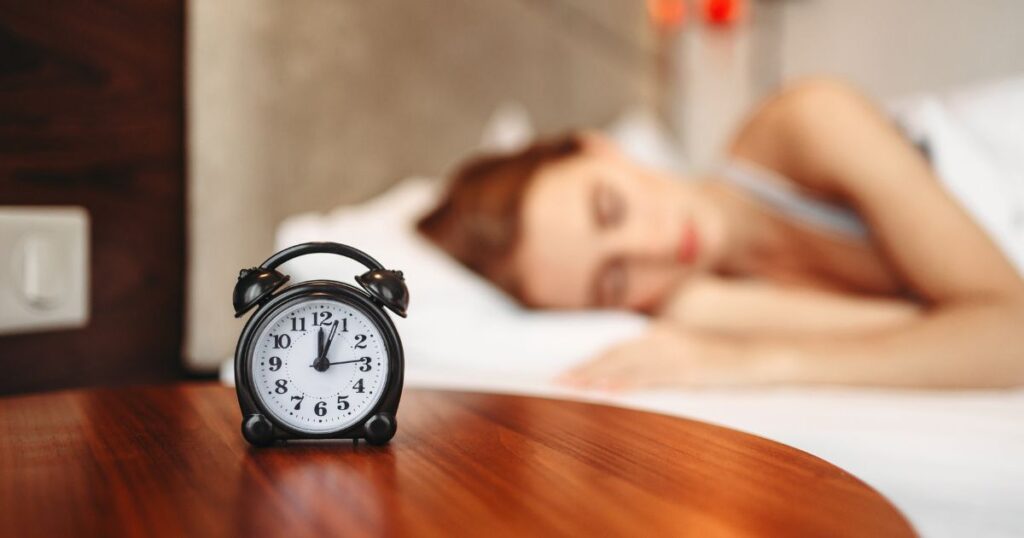
2. Sleep Stages and Sleep Architecture
Sleep is divided into several stages, each with unique characteristics and functions:
- Non-Rapid Eye Movement (NREM) Sleep: This stage consists of three phases and is essential for physical restoration, energy conservation, and memory consolidation.
- Rapid Eye Movement (REM) Sleep: REM sleep is vital for emotional regulation, memory consolidation, and cognitive function.
Any disruption in sleep hygiene can affect the structure and duration of these sleep stages, leading to fragmented sleep and reduced sleep quality. You must adopt good sleep hygiene practices that will help you progress through these stages of sleep smoothly and get rejuvenated every day.
3. Sleep Homeostasis
Sleep homeostasis is the process that regulates the balance between sleep and wakefulness in humans.
Adenosine, a neurotransmitter, accumulates in the brain while we are awake and promotes sleep. Getting high-quality sleep reduces our adenosine levels, allowing us to feel refreshed and alert when we wake up.
Poor sleep hygiene, such as irregular sleep schedules or inadequate sleep duration, can disrupt this balance, leading to increased sleepiness during the day and difficulty falling asleep at night.
You can optimize sleep homeostasis and improve your overall sleep quality.by maintaining a consistent sleep schedule and prioritizing sleep hygiene.

4. Impact of Lifestyle Factors
Several lifestyle factors can significantly impact sleep quality, including diet, exercise, and stress levels:
- Diet: Consuming heavy meals, caffeine, or alcohol close to bedtime can disrupt sleep patterns and reduce sleep quality. Eating a balanced diet and avoiding stimulating substances before bed can promote better sleep.
- Exercise: Regular physical activity can improve sleep quality by reducing stress, promoting relaxation, and regulating sleep-wake cycles. However, exercising too close to bedtime can have the opposite effect, making it harder to fall asleep.
- Stress and Mental Health: Chronic stress, anxiety, and mood disorders can significantly impact sleep quality and duration. You may adopt stress management techniques, such as meditation, mindfulness, or relaxation exercises, to get over these problems and improve your sleep hygiene.
The science behind sleep hygiene shows how important it is for us to adopt healthy sleep habits that help optimize our sleep quality and enhance our overall well-being.
Frequently Asked Questions
What is the best time to go to bed for optimal sleep?
The best time to go to bed for optimal sleep depends on individual factors such as how much sleep you need, your lifestyle, and your personal preferences. Generally, aiming for a consistent sleep schedule that allows for 7-9 hours of sleep aligns with the body’s natural circadian rhythm and promotes a good night’s sleep.
Can napping during the day affect nighttime sleep?
Napping during the day can affect nighttime sleep, especially if the nap is too long or taken too close to bedtime. Napping can reduce sleepiness in the short term, but it may disrupt the natural sleep-wake cycle and make it harder to fall asleep at night. You may limit or avoid napping to maintain a consistent sleep schedule and promote better nighttime sleep.
How long should a good sleep hygiene routine take to show results?
The time it takes for a good sleep hygiene routine to show results may vary from person to person. Consistently practicing healthy sleep habits, such as maintaining a consistent sleep schedule and creating a relaxing bedtime routine, can lead to improved sleep quality and better overall sleep hygiene over time.
Is it necessary to see a doctor for occasional sleeplessness?
Occasional sleeplessness is common and can often be managed by practicing good sleep hygiene. However, if occasional sleeplessness becomes frequent or persistent, it may be necessary to consult a healthcare provider. A healthcare provider can help identify any underlying causes or sleep disorders and provide appropriate guidance and treatment options.
Some final words
If you have not done so already, then you must start focusing on your sleep hygiene to optimize your health and well-being. Try to implement good sleep habits and follow the techniques I have mentioned here to significantly improve your sleep quality. This will give you several health benefits from getting some sound, restorative sleep.
Browse through the other articles to get a deeper understanding of this intriguing process called “sleep”. You will also find some great product recommendations that will help you sleep better.
Also,share this article with your friends and family who might be having difficulty sleeping well. Let’s help everyone sleep better and become healthy and happy.

